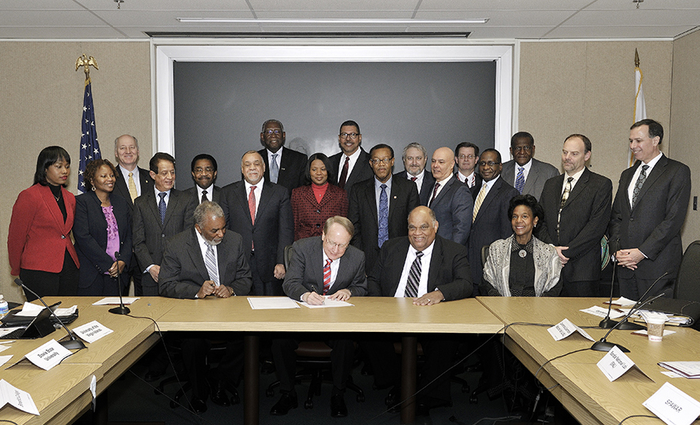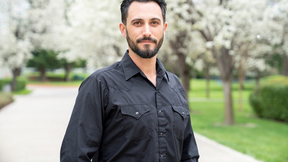Labs team up with historically black colleges and universities in cybersecurity consortium
 (Download Image)
DOE Undersecretary for Nuclear Security and NNSA Administrator Frank Klotz signs the agreement for the Cybersecurity Workforce Pipeline, which provides a $25 million grant over five years and connects Lawrence Livermore and Sandia national laboratories with 13 Historically Black Colleges and Universities and the Charleston County School District in South Carolina.
(Download Image)
DOE Undersecretary for Nuclear Security and NNSA Administrator Frank Klotz signs the agreement for the Cybersecurity Workforce Pipeline, which provides a $25 million grant over five years and connects Lawrence Livermore and Sandia national laboratories with 13 Historically Black Colleges and Universities and the Charleston County School District in South Carolina.
LIVERMORE, California – With national and global threats related to cybercrime at an all-time high, there is a considerable and growing need for expertise in cybersecurity. The Department of Energy’s National Nuclear Security Administration (DOE/NNSA) recently announced that Lawrence Livermore National Laboratory (LLNL) will participate as a partner in a Cybersecurity Workforce Pipeline Consortium to help solve pressing and challenging cybersecurity problems, to meet mission needs, anticipate future challenges and assist in developing talent for the growing cyber workforce.
The consortium was established by the DOE/NNSA’s Minority Serving Institutions Partnerships Program (MSIPP) in order to create an underrepresented talent pipeline from Minority Serving Institutions (MSIs) to DOE laboratories and plants to help strengthen cybersecurity expertise.
Through a $25 million grant, the five-year partnership will connect LLNL and Sandia national laboratories with 13 Historically Black Colleges and Universities (HBCUs) and the Charleston County School District in South Carolina. The program will give students from the HBCUs the depth and hands-on training they might not get if enrolled in a typical computer science or cybersecurity program. The educational enrichment will ensure that students participating in the consortium will develop strong skills and will be able to fill opportunities within the national laboratories and throughout the nation.
The Laboratory will be an active participant by providing technical expertise and guidance on curriculum in math, computer science and cybersecurity, and will provide students with mentors, resources, support and on-the-job training in a stimulating work environment.
Vice President Joseph Biden and Secretary of Energy Ernest Moniz highlighted DOE/NNSA’s Cybersecurity Workforce Pipeline Consortium at a Norfolk State University ceremony last week, followed by a signing of the agreement last Friday at the White House and hosted by DOE/NNSA.
LLNL Director Bill Goldstein attended the White House event along with Tony Baylis, director of the Office of Strategic Diversity & Inclusion Programs at LLNL. Goldstein moderated a panel that highlighted personal stories, experiences and perspectives from across the pipeline of students to employers on potential for the DOE-HBCU cybersecurity education consortium, and like partnerships, to make real impact in the cybersecurity workforce. LLNL researcher Celeste Matarazzo and Oscar Gonzalez, an evaluator and consultant on the project, and scholars from LLNL also were in attendance. Matarazzo is the program manager of the Cyber Defenders program, where the students will be placed.
"Lawrence Livermore National Laboratory and many other organizations have a considerable and growing need for expertise in cybersecurity," said Goldstein. "We need this expertise not only to protect the security of our own computer systems, but also because it is an area where our sponsors — the Department of Energy and a variety of other government agencies — expect our help.
"A workforce that is highly skilled in computer science and cybersecurity is essential," Goldstein continued. "To ensure that we have a pipeline that provides continued excellence in this area, we have been engaged in helping train and in providing experience for the next generation of cybersecurity experts through activities such as our Cyber Defenders program."
The Cyber Defenders program allows interns from HBCUs to develop skills in areas such as intrusion detection and prevention, network monitoring, anomaly detection, machine learning, cyber assurance (plans and policy), vulnerability assessment, forensics, malware analysis, reverse engineering cyber assurance, training and security operations. Working closely with their LLNL mentors, students complete a research project and share their results through a presentation and at a poster session. The students experience the challenges of working on real world problems and build a professional network that will benefit them throughout their career.
"We are very excited about the outstanding opportunity that this new program represents," Goldstein said. "To solve the pressing and challenging cybersecurity problems that face us, we will require a diverse workforce — including diversity in experience, point of view and backgrounds — to help us meet our mission needs and anticipate future challenges.
"This program is a win-win for all involved," Goldstein added. "The laboratories will be able to identify and cultivate diverse talent early for DOE mission areas
Contact
 Carrie L Martin
Carrie L Martin
[email protected]
(925) 424-4715
Related Links
Vice President Biden Announces $25 Million in Funding for Cybersecurity Education at HBCUsNNSA Hosts Cybersecurity Consortium Members Following White House Announcement of $25 Million in Grants to 13 HBCUs
Tags
HPC, Simulation, and Data ScienceComputing
Community Outreach
Featured Articles







